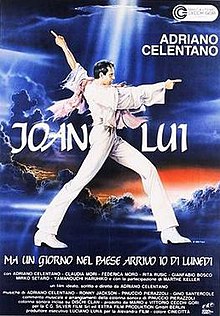Joan Lui
| Joan Lui | |
|---|---|
 Italian theatrical release poster by Renato Casaro | |
| Directed by | Adriano Celentano |
| Written by | Adriano Celentano |
| Produced by | Mario & Vittorio Cecchi Gori |
| Starring |
|
| Cinematography | Alfio Contini |
| Edited by | Adriano Celentano |
| Music by | Adriano Celentano Pinuccio Pirazzoli Ronny Jackson Gino Santercole |
| Distributed by | Variety Distribution |
Release date |
|
Running time | 163 min 133 min (cut edition) 125 min (Home Video cut) |
| Country | Italy |
| Language | Italian |
Joan Lui (also known as Joan Lui - Ma un giorno nel paese arrivo io di lunedì) is a 1985 Italian musical comedy film by Adriano Celentano. It was the fourth and the last films Celentano wrote, starred in and directed.
Plot[edit]
Joan Lui is a singer who has come from another world to condemn the hypocrisy and atrocities of the Western culture. When he arrives in Italy, he seeks to create a band composed of young and inexperienced musicians to better spread his message. After having exposed the deception of a major musical producer, Joan Lui disappears into thin air. Meanwhile, the world is plunged into a terrible apocalypse.
Cast[edit]
- Adriano Celentano: Joan Lui
- Claudia Mori: Tina Foster
- Marthe Keller: Judy Johnson
- Federica Moro: Emanuela Carboni
- Edwin Marian: Cap. Arthur
- Gian Fabio Bosco: Winston
- Mirko Setaro: Musico
- Rita Rusic: Temple singer
- Haruhiko Yamanouchi: Jarak
- Piero Nuti: Franky
- Edoardo Romano: Prime Minister
- Sal Borgese: Frank
- Gino Cogliandro: Bartender
- Francesco Salvi: Journalist
- Romano Puppo: Assassin
Soundtrack[edit]
- L'uomo perfetto
- Sex without Love
- Il tempio
- Mistero
- Lunedì
- Qualcosa nascerà
- Splendida e nuda
- L'ora è guinta
- La prima stella
Production[edit]
The film was the center of a dispute between Mario and Vittorio Cecchi Gori and Celentano as the producers decided, a month after theatrical release, to replace the original cut with another version with a different editing and 30 minutes shorter.[1][2]
Reception[edit]
The film was a box office bomb, grossing 7.3 billion lire at the Italian box office in spite of a budget of about 20 billion lire.
The film also received generally bad reviews. Morando Morandini described it as "an enormous music video based on visual shock, jam-packed with music, with some monumental sets and elaborate editing. A true festival of kitsch also on an ideological level".[3] According to Paolo Mereghetti the film, "a personal reading of Christianity in musicals", "a personal delusion of omnipotence", and "a mock-apocalyptic madness that is just able to list the worst clichés of indifference".[4]
References[edit]
- ^ Poppi, Roberto (2000). I film - 5: Dal 1980 al 1989. 1, A-L. Dizionario del cinema italiano (in Italian). Rome: Gremese. ISBN 88-7742-423-0.
- ^ Giusti, Marco (1999). Dizionario dei film italiani stracult (in Italian). Milan: Sperling & Kupfer. ISBN 88-200-2919-7.
- ^ Morandini, Laura; Morandini, Morando; Morandini, Luisa (1999). Il Morandini: dizionario dei film 2000 (in Italian). Bologna: Zanichelli. ISBN 88-08-02037-1.
- ^ Mereghetti, Paolo (2010). Il Mereghetti: dizionario dei film 2011 (in Italian). Milan: Baldini Castoldi Dalai. ISBN 978-88-6073-626-0.
